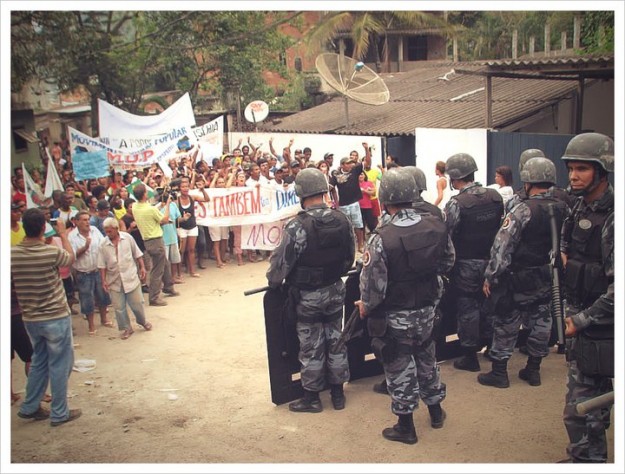Since the April rains that ushered in so many changes in Rio de Janeiro Mundo Real has been increasingly engaged in media projects. It became frustratingly apparent that the mainstream media in Brazil does not cover the issues facing communities like Rocinha, such as forced evictions, from the perspective of local residents. A simple analysis of the material published since April would prove that the media has been very biased in their coverage of the forced evictions and the current attempts to ‘remake’ Rio de Janeiro in light of the upcoming mega-events. This is why Amnesty International was so shocked when they visited Laboriaux and seven other favela communities in October. They indicated their awareness that injustices were taking place, in regards to forced evictions and violations of housing rights, but that they had no idea the situation was so widespread and severe.
This has been a common response even from those who study and monitor favelas. Recently a professor at CUNY in New York who is a specialist on favelas and Public Security Policy in Brazil informed Mundo Real that the newspapers are not covering the resistance to the forced evictions and mega-events. A recent piece from CNN’s website illustrates this perfectly (http://edition.cnn.com/2010/WORLD/asiapcf/11/18/urban.slums/index.html?hpt=Sbin). In the article on urban sprawl and slum proliferation, Jeb Brugmann, an urban development consultant and author of Welcome to the Urban Revolution stresses that “clearing slums and re-housing their residents elsewhere isn’t a long-term solution” and that “There is no history of success in clearing slums and moving the people somewhere else.” He advocates, as many before him have, that instead “governments should concentrate on improving the conditions of slums” which he prefers to call “migrant cities.” Brugmann states that “When offered the proper support, slums can become very robust, resilient, economic districts.” So far so good, but Brugmann then points to the Brazilian approach in dealing with favelas. He mentions that “Brazil has brought basic services, such as drainage, water, schools and health clinics, to its favelas. It’s also helping residents who have brought their dwellings up to the standard for municipal buildings get legal titles to the land.” It is hard to fathom how a supposed urban development consultant can be unaware of the largest forced eviction campaign taking place in Brazil since the military dictatorship of the 1960s and 70s. There are roughly 122 favela communities in Rio de Janeiro alone facing forced eviction and favelas in São Paulo, Fortaleza and other cities that will host mega-events are facing similar challenges. In Brugmann’s defense, unless one is in the trenches so to speak, living or working regularly in the favelas, it is hard to grasp what is actually taking place at the local level because it is not being covered in the media. The media is an enormously powerful tool for controlling what information regular people have access to and in shaping the way we view issues that are reported. We plan to increasingly engage in media projects so that we can play our part in expressing the voice of the people, at the local level whose opinions and stories are so often left out of mainstream for-profit media conglomerates.
The mainstream media has become more powerful and influential, but at the same time media in general has also become more democratic. Free source like the YouTube, Blogs, Face book, Twitter, etc, have made it possible for average people to get their voice out. With a relatively cheap digital camera and an internet connection important media projects can be produced as Irmã Fatima and the other residents from the favela of Estradinha have shown (http://wwwestradinha1014.blogspot.com/). While much can be produced with inexpensive and even free sources Mundo Real aims to obtain more professional equipment to produce sophisticated media projects.
Currently Mundo Real is working on a documentary film that focuses on the months immediately after the April rains and the City’s response in the form of forced eviction policies. The film is set to be released by the end of this year or in early 2011. We have posted a couple of previews on our website so please take a look when possible. The 8 minute clip focuses mostly on expert advice challenging the City’s version of events. It includes sections on housing rights, environmental risk and the history of forced evictions in Rio de Janeiro. The 6 minute piece is centered more on the local reality in Laboriaux and the reaction of residents to abuse from the City and State government.

